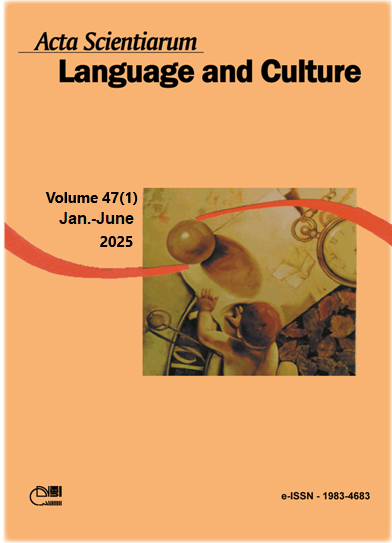Verbal attacks on Ghanaian traditional leaders on an online news platform
Resumo
The aim of this paper is to analyse verbal attacks targeting three prominent Ghanaian traditional leaders in comments on news articles published on GhanaWeb. The paper relies on appraisal theory, social actor analysis, and the theory of impoliteness to qualitatively analyse a number of purposively selected comments on the subject, published on the news website in 2022. The paper reports that these traditional leaders were verbally attacked on the basis of their capacity, truthfulness, propriety and seriousness. These attacks were based on the chiefs’ alleged failure to protect the land and natural resources from illegal mining, their engagement in partisan politics, and some criminal activities. The paper argues that as verbal attacks are not culturally permitted in Ghana, it is the anonymity of the news site that encourages these commenters to verbally attack the chiefs. This paper serves as a springboard for further research on verbal attacks, not only on the comment sections of news sites in other communities but on social media platforms as well.
Downloads
Referências
Abotchie, C. (2006). Has the position of the chief become anachronistic in the contemporary Ghanaian politics? In I. K. Odotei, & A. K. Awedoba (Eds.), Chieftaincy in Ghana: culture, governance and development (pp. 169-182). Sub-Saharan Publishers.
Aborampah, Y.-M. (2023). Address forms of the Kolamↄ of Ghana: A sociolinguistic analysis. Journal of Engineering Applied Science and Humanities, 8(1), 90-101. https://doi.org/10.53075/Ijmsirq/6535355
Agovi, K. (1995). The king is not above insult: The politics of good governance in Nzema Avudeme festival songs. In G. Furniss, & L. Gunner (Eds.), Power, marginality and african oral literature (pp. 47-61). Cambridge University Press.
Agyekum, K. (2010). Akan verbal taboos in the context of ethnography of communication. Ghana Universities Press.
Agyekum, K. (2011). The ethnopragmatics of the Akan palace language of Ghana. Journal of Anthropological Research, 67(4), 573-593. https://doi.org/10.3998/jar.0521004.0067.404
Aning, K., Brown, M. A., Boege, V., & Hunt, C. T. (2018). Exploring peace formation: security and justice in post-colonial states. Routledge.
Asamoah, K. (2012). A qualitative study of chieftaincy and local government in Ghana. Journal of African Studies and Development, 4(3), 90-95. https://doi.org/10.5897/JASD11.089
Asori, M., Mpobi, R. K. J., Morgan, A. K., Apoanaba, T. A., Katey, D., Ampofo, S. T., Julius, O., & Appiah, D. O. (2023). Is illegal mining socio-politically entrenched? An opinion piece of the interaction between formal politics and chief dominance in mineral governance, and its influence on fighting Galamsey in Ghana. GeoJournal, 88, 1953-1963. https://doi.org/10.1007/s10708-022-10725-1
Ayittey, G. B. N. (2006). Indigenous African institutions (2nd ed.). Transnational Publishers.
Blitvich, P. G.-C. (2010). The YouTubification of politics, impoliteness and polarization. In R. Taiwo (Ed.), Handbook of research on discourse behaviour and digital communication: Language structures and social interaction (pp. 540-563). IGI Global.
Boateng, K. K., & Afranie, S. (2020). Chieftaincy: An anachronistic institution within a democratic dispensation? The case of a traditional political system in Ghana. Ghana Journal of Development Studies, 17(1), 25-47. http://dx.doi.org/10.4314/gjds.v17i1.2
Bou-Franch, P., & Blitvich, P. G.-C. (2014). Gender ideology and social identity processes in online language aggression against women. Journal of Language Aggression and Conflict, 2(2), 226-248. https://doi.org/10.1075/jlac.2.2.03bou
Boulton, T. (2004). Interactions between the local government and the traditional authorities. African Diaspora ISPs, Paper 63. http://digitalcollections.sit.edu/african_diaspora_isp
Braun, V., & Clarke, V. (2006). Using thematic analysis in psychology. Qualitative Research in Psychology, 3(2), 77-101. https://doi.org/10.1191/1478088706qp063oa
Brierley, S., & Ofosu, G. K. (2023). Chiefs’ endorsements and voter behavior. Comparative Political Studies, 57(10), 1-32. https://doi.org/10.1177/00104140231194916
Bukari, K. N., Osei-Kufuor, P., & Bukari, S. (2021). Chieftaincy conflicts in northern Ghana: A constellation of actors and politics. African Security, 14(2), 156-185. https://doi.org/10.1080/19392206.2021.1932244
Camp, E. (2017). Why metaphors make good insults: Perspectives, presupposition, and pragmatics. Philosophical Studies, 174, 47-64. https://doi.org/10.1007/s11098-015-0525-y
Charteris-Black, J. (2019). Metaphors of Brexit: No cherries on the cake? Palgrave Macmillan.
Cavasso, L., & Taboada, M. (2021). A corpus analysis of online news comments using the Appraisal framework. Journal of Corpora and Discourse Studies, 4, 1-38. http://doi.org/10.18573/jcads.61
Culpeper, J. (2010). Conventionalised impoliteness formulae. Journal of Pragmatics, 42(12), 3232-3245. https://doi.org/10.1016/j.pragma.2010.05.007
Culpeper, J. (2011). Impoliteness. Using language to cause offence. Cambridge University Press.
Culpeper, J., Iganski, P., & Sweiry, A. (2017). Linguistic impoliteness and religiously aggravated hate crime in England and Wales. Journal of Language Aggression and Conflict, 5(1), 1-29. https://doi.org/10.1075/jlac.5.1.01cul
Darkwa, S. K. (2022). One-party rule and military dictatorship in Africa. In F. Kumah-Abiwu, & S. O. Abidde (Eds.), Jerry John Rawlings. Leadership and legacy: A pan-African perspective (pp. 35-47). Springer.
Effron, D. A., O’Connor, K., Leroy, H., & Lucas, B. J. (2018). From inconsistency to hypocrisy: When does “saying one thing but doing another” invite condemnation? Research in Organizational Behavior, 38, 61-75. https://doi.org/10.1016/j.riob.2018.10.003
Ehret, K. & Taboada, M. (2020). Are online news comments like face-to-face conversation? Register Studies, 2(1), 1-36. https://doi.org/10.1075/rs.19012.ehr
Ehret, K., & Taboada, M. (2021). Characterising online news comments: a multi-dimensional cruise through online registers. Frontiers in Artificial Intelligence, 4(643770). https://doi.org/10.3389/frai.2021.643770
Faria, R. (2023). Stance-taking and gender: hateful representations of Portuguese women public figures in the NETLANG corpus. In I. Ermida (Ed.), Hate speech in social media (pp. 311-339). Palgrave Macmillan.
Goffman, E. (1967). Interactional ritual: Essays on face-to-face behavior. Anchor Books.
Hansson, S., Page, R., & Fuoli, M. (2022). Discursive strategies of blaming: the language of judgment and political protest online. Social Media+ Society, 8(4), 1-14. https://doi.org/10.1177/20563051221138753
Kiesling, S. F., Pavalanathan, U., Fitzpatrick, J., Han, X., & Eisenstein, J. (2018). Interactional stancetaking in online forums. Computational Linguistics, 44(4), 683-718. https://doi.org/10.1162/coli a 00334
Kolhatkar, V., Thain, N., Sorensen, J., Dixon, L., & Taboada, M. (2020). Classifying constructive comments. arXiv preprint arXiv:2004.05476. https://arxiv.org/abs/2004.05476
Kopytowska, M., & Baider, F. (2017). From stereotypes and prejudice to verbal and physical violence: Hate speech in context. Lodz Papers in Pragmatics, 13(2), 133-152. https://doi.org/10.1515/lpp-2017-0008
Lawer, E. T., Lukas, M. C., & Jørgensen, S. H. (2017). The neglected role of local institutions in the ‘resource curse’debate. Limestone mining in the Krobo region of Ghana. Resources Policy, 54, 43-52. http://dx.doi.org/10.1016/j.resourpol.2017.08.005
Leeuwen, T. van (2008). Discourse and practice: New tools for critical discourse analysis. Oxford University Press.
Marcoccia, M. (2004). On-line polylogues: Conversation structure and participation framework in internet newsgroups. Journal of Pragmatics, 36(1), 115-145. https://doi.org/10.1016/S0378-2166(03)00038-9
Martin, J. R. & Rose, D. (2008). Genre relations: mapping culture. Equinox.
Martin, J. R., & White, P. R. (2005). The language of evaluation: appraisal in English. Palgrave Macmillan.
Mawuko-Yevugah, L., & Attipoe, H. A. (2021). Chieftaincy and traditional authority in modern democratic Ghana. South African Journal of Philosophy, 40(3), 319-335. https://doi.org/10.1080/02580136.2021.1964206
Nobata, C., Tetreault, J., Thomas, A., Mehdad, Y., & Chang, Y. (2016). Abusive language detection in online user content [Work presentation]. Proceedings of the 25th International Conference on World Wide Web (pp. 145-153). Republic and Canton of Geneva, CHE. https://doi.org/10.1145/2872427.2883062
Nowell, L. S., Norris, J. M., White, D. E., & Moules, N. J. (2017). Thematic analysis: Striving to meet the trustworthiness criteria. International Journal of Qualitative Methods, 16(1), 1-13. https://doi.org/10.1177/1609406917733847
Nukunya, G. K. (2003). Tradition and change in Ghana: An introduction to Sociology. Ghana Universities Press.
Ofori, E. A. (2015). The use of insults in Ghanaian political discourse: a critical discourse analysis [Unpublished doctoral thesis]. University of Florida.
Ofori, E. A. (2017). The use of insults to challenge political authority: a critical discourse analysis. Language, Discourse & Society, 5(9), 129-143.
Ofori, E. A., Laryea, C. O., Kubi, B., & Fiawornu, V. Y. (2021). The use of metaphors and similes in a political discourse in Ghana. LWATI: A Journal of Contemporary Research, 18(2), 74-95.
Oku, G. K., & Korsah, L. A. (2019). Examining the historical development of the chieftaincy institutions in Ghana. Journal of African Studies and Ethnographic Research, 1(1), 78-87.
Opuni-Frimpong, K. (2021). The Akan traditional leadership formation: Some lessons for Christian leadership formation. E-Journal of Humanities, Arts and Social Sciences, 2(7), 75-91. https://doi.org/10.38159/ehass.2021272
Pas, D. J. Van der, & Aaldering, L. (2020). Gender differences in political media coverage: A meta-analysis. Journal of Communication, 70(1), 114-143. https://doi.org/10.1093/joc/jqz046
Risch, J., Stoll, A., Wilms, L., & Wiegand, M. (2021). Overview of the GermEval 2021 shared task on the identification of toxic, engaging, and fact-claiming comments [Work presentation]. Proceedings of the GermEval 2021 Shared Task on the Identification of Toxic, Engaging, and Fact-Claiming Comments. Duesseldorf, GE. https://aclanthology.org/2021.germeval-1.1/
Rohrbach, T., Fiechtner, S., Schönhagen, P., & Puppis, M. (2020). More than just gender: Exploring contextual influences on media bias of political candidates. The International Journal of Press/Politics, 25(4), 1-20. https://doi.org/10.1177/1940161220912694
Ross, A. S., & Caldwell, D. (2020). ‘Going negative’: An appraisal analysis of the rhetoric of Donald Trump on Twitter. Language & Communication, 70, 13-27. https://doi.org/10.1016/j.langcom.2019.09.003
Swales, J. M. (1990). Genre analysis: English in academic and research settings. Cambridge University Press.
Tenkorang, E. Y. (2021). Illegal small-scale mining in Asutifi North District, Ghana: Traditional authority’s tacit support for an illegality. African Social Science Review, 11(1), Article 7.
Terry, G., Hayfield, N., Clarke, V., & Braun, V. (2017). Thematic analysis. In C. Willig, & W. Stainton-Rogers (Eds.), The sage handbook of qualitative research in psychology (2nd ed., pp. 17-36). Sage.
Thompson, R. (2019). Tweaa!–A Ghanaian interjection of “contempt” in online political comments. Ampersand, 6, Article 100047. https://doi.org/10.1016/j.amper.2019.100047
Thompson, R. (2020). Common akan insults on GhanaWeb: A semantic analysis of kwasea, aboa and gyimii. In B. Peeters, K. Mullan, & L. Sadow (Eds.), Studies in ethnopragmatics, cultural semantics, and intercultural communication: Meaning and culture (pp. 103–122). Springer.
Thompson, R. (2021a). Cultural scripts for asymmetrical interactions in Ghana. Nordic Journal of African Studies, 30(1), 24–24. https://doi.org/10.53228/njas.v30i1.750
Thompson, R. (2021b). Insults in political comments on GhanaWeb: Ethnopragmatic perspectives. Pragmatics and Society, 12(1), 33–58. https://doi.org/10.1075/ps.17040.tho
Thompson, R. (2025). Unpacking the Akan interjection apuu: A natural semantic metalanguage approach. In L. Sadow, K. Mullan, & C. Goddard (Eds.), Explorations in applied ethnolinguistics: Words, cultures, and global perspectives (pp. 228-238). Palgrave Macmillan.
Tieleman, J., & Uitermark, J. (2018). Chiefs in the city: Traditional authority in the modern state. Sociology, 53(4), 707-723. https://doi.org/10.1177/0038038518809325
Titak, A., & Roberson, A. (2013). Dimensions of web registers: An exploratory multi-dimensional comparison. Corpora, 8(2), 235-260. https://doi.org/10.3366/cor.2013.0042
Tracy, K., & Tracy, S. J. (1998). Rudeness at 911: Reconceptualizing face and face attack. Human Communication Research, 25(2), 225-251. https://doi.org/10.1111/j.1468-2958.1998.tb00444.x
Walters, M. A. (2013). Conceptualizing ‘hostility’ for hate crime law: Minding ‘the minutiae’ when interpreting Section 28(1)(a) of the Crime and Disorder Act 1998. Oxford Journal of Legal Studies, 34(1), 47-74. https://doi.org/10.1093/ojls/gqt021
Why these influential traditional leaders have given Ghanaians a lot to talk about. (2022, October 25). GhanaWeb. https://www.ghanaweb.com/GhanaHomePage/NewsArchive/Why-these-influential-traditional-leaders-have-given-Ghanaians-a-lot-to-talk-about-1649774
Wulczyn, E., Thain, N., & Dixon, L. (2017). Ex machina: Personal attacks seen at scale [Work presentation]. Proceedings of the 26th International Conference on World Wide Web. Perth, AU. https://doi.org/10.1145/3038912.3052591
DECLARAÇÃO DE ORIGINALIDADE E DIREITOS AUTORAIS
Declaro que o presente artigo é original, não tendo sido submetido à publicação em qualquer outro periódico nacional ou internacional, quer seja em parte ou em sua totalidade.
Os direitos autorais pertencem exclusivamente aos autores. Os direitos de licenciamento utilizados pelo periódico é a licença Creative Commons Attribution 4.0 (CC BY 4.0): são permitidos o acompartilhamento (cópia e distribuição do material em qualqer meio ou formato) e adaptação (remix, transformação e criação de material a partir do conteúdo assim licenciado para quaisquer fins, inclusive comerciais.
Recomenda-se a leitura desse link para maiores informações sobre o tema: fornecimento de créditos e referências de forma correta, entre outros detalhes cruciais para uso adequado do material licenciado.




















6.png)









